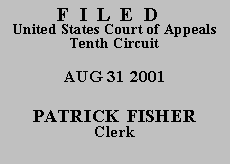

| UNITED STATES OF AMERICA,
Plaintiff-Appellee, |
|
| v. | |
| MILTON HANSEN,
Defendant-Appellant. |
|
Milton Hansen, a federal prisoner proceeding pro se, requests a certificate of appealability to appeal the denial of his 28 U.S.C. § 2255 habeas petition. We deny a certificate of appealability and dismiss the appeal.
Hansen pled guilty to one count of attempted manufacture of methamphetamine pursuant to a plea agreement and, on August 26, 1998, was sentenced to seventy months in prison. He did not file a direct appeal. He filed his 28 U.S.C. § 2255 petition on November 21, 2000, asserting he was sentenced contrary to the strictures of Apprendi v. New Jersey, 530 U.S. 466 (2000). The magistrate judge recommended that the petition be dismissed as untimely. The district court adopted the magistrate's report and recommendation and dismissed the petition.
As an initial matter, we address the question of jurisdiction. This court has adopted a "firm waiver" rule when a party fails to object to the findings and recommendations of the magistrate judge. Moore v. United States, 950 F.2d 656, 659 (10th Cir. 1991). "Our waiver rule provides that the failure to make timely objection to the magistrate's findings or recommendations waives appellate review of both factual and legal questions." Id. However, Hansen mailed his objections on the tenth day after the report and recommendation was filed and the district court referenced his objections in its opinion. Therefore, we have jurisdiction to consider the case on its merits.
Generally, § 2255 prohibits a prisoner from filing a petition more than a year after the final judgment of conviction. Hansen filed his petition more than two years after the final judgment. However, he argues his petition is within the following exception to the one-year standard rule: "The limitation period shall run from . . . the date on which the right asserted was initially recognized by the Supreme Court, if that right has been newly recognized by the Supreme Court and made retroactively applicable to cases on collateral review." 28 U.S.C. § 2255.
We need not reach the retroactivity issue. Apprendi is only relevant where a defendant has been sentenced beyond the statutory maximum. See United States v. Keeling, 235 F.3d 533, 538 (10th Cir. 2000). Hansen pled guilty to attempted manufacture of methamphetamine pursuant to 21 U.S.C. §§ 841(a)(1) and 846. The maximum sentence for this crime is twenty years. See § 841(b)(1). Because Hansen was sentenced to less than the statutory maximum, Apprendi does not apply. See United States v. Thompson, 237 F.3d 1258 (10th Cir. 2001).
Hansen has not "made a substantial showing of the denial of a constitutional right," 28 U.S.C. § 2253(c)(2). We DENY a certificate of appealability and DISMISS the appeal. The motion to proceed in forma pauperis on appeal is DENIED. The mandate shall issue forthwith.
Entered for the Court
Mary Beck Briscoe
Circuit Judge
*.This order and judgment is not binding precedent, except under the doctrines of law of the case, res judicata, and collateral estoppel. The court generally disfavors the citation of orders and judgments; nevertheless, an order and judgment may be cited under the terms and conditions of 10th Cir. R. 36.3.